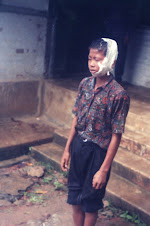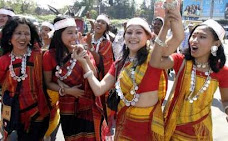Parallel Session In CSW Meeting, United Nations , New York
Human Rights Congress for Bangladesh Minorities (HRCBM)
A Session on the Status of Minority Women at the United Nations,
On Friday March 6, 2009
Indigenous Women's Struggle for Justice in the Chittagong Hill Tracts, Bangladesh
By
Indigenous Jumma People’s Network USA. www.ijpnus.org
For ages, the Chittagong Hill Tracts of Bangladesh have been home to the indigenous Jumma peoples, who differ greatly in terms of history and culture from the majority Bengali people of the plains. From the 1950’s, the then East Pakistan government denied the rights of the indigenous peoples, building the massive Kaptai dam that submerged much of the fertile land in the region and evicted some 100,000 people. After Bangladeshi independence, the new government conducted a massive transmigration program to settle some 400,000 outsiders in the hill tracts, and placed the region under military occupation, leading to armed conflict with indigenous guerillas.
Countless killings, rapes and other human rights abuses, as well as 13 massacres forced more than 60,000 indigenous people to flee to India as refugees, and countless others to become internally displaced. Some 120,000 households are said to have thus lost their lands. Under international pressure, the Bangladesh government signed a peace accord with the indigenous political party PCJSS in 1997, resulting in repatriation of the refugees and demobilization of the guerillas. However, to this day the government has failed to keep most of its promises under the peace accord. With most problems unsolved, land grabbing, communal attacks, rape and other human rights abuses, and ethnic conflict have continued.
In this conflict of more than twenty years, it is the impoverished hill women who have been most victimized. To this day, women of all ages suffer from rape and violence, and the perpetrators are seldom brought to justice.
During the armed conflict, many indigenous women reported that they had stopped wearing their traditional dress, and some young girls had their heads shaved and dressed like boys to avoid being immediately recognised as indigenous women and thus becoming easy victims of sexual violence. Many indigenous women were raped and killed by the security forces and Bengali settlers, many disappeared and were forcibly converted to Islam and married to Bengalis. There were even cases in which the rape victims were held in jail in so-called "safe custody" while the perpetrators were allowed to roam free. For instance, on 28 June 1998, 13-year-old Kucharung Tripura was raped by three settlers at Alikadam thana, and was subsequently held in jail for 7 months, supposedly to protect her.
The most well known case of violence against indigenous hill women is the disappearance of Kalpana Chakma, Organising Secretary of the Hill Women's Federation, an indigenous women's activist group. She was abducted from her home in Rangamati district on the night of 11-12 June 1996 by a group of plainclothes army personnel, never to be seen again. After repeated protests and international pressure, the government set up an enquiry commission, which presented its report to the government in March 1997, but this report was never made public. Kalpana is assumed to have been killed, but there are no reports of punishment of those responsible.
The abduction of Kalpana Chakma got wide publicity, but the vast majority of rape cases go unreported, and are perpetrated with almost total impunity. Especially during the armed conflict in the CHT, Jumma women were extremely vulnerable to rape, gang rape, molestation and harassment. According to the Hill Women's Federation, over 94% of the rape cases of Jumma
women in the CHT between 1991 and 1993 were by 'security forces'. Over 40% of the victims were women under 18 years of age.
Even after the signing of the 1997 Peace Accord, hill women continue to live in fear. They are especially targetted in violent attacks on indigenous villages with the aim to grab land. On August 23rd, 2003, a dozen villages in Mahalchari sub-district of Khagarachari district were attacked by a mob of angry settlers. More than 400 houses were burned down, 4 Buddhist temples were destroyed, an elderly man and baby were killed, and 10 Chakma women were gang raped. The perpetrators were never arrested, and continued to live near the traumatized communities and grab land from them. And on April 3rd 2006, two 18 year old Marma women were gang raped in an attack of land-hungry Bengali settlers on 3 villages in Maischari area of Mahalchari, Khagrachari district, in which about 100 houses were destroyed and several dozen hill people were injured. The women filed a case against the perpetrators, but had to go into hiding because of threats.
In the hill tracts, the police often refuse to accept reports of rapes. The courts are also unsympathetic. Many victims have no choice but to accept paltry sums of compensation, rather than seek justice in the courts, which can be very costly and take many years. Traditional village courts are often not much better.
For example, on Nov. 26th 2007, Ms. V. Tripura, aged 15, was raped by a local Bengali settler while she was collecting firewood from a nearby field. Hearing her screams, her parents rushed to the scene, but it was too late to save their daughter. The villagers captured the culprit and brought him to the police station, but the police refused to arrest him or accept the case. So the villagers asked the local hospital to keep the culprit in custody. Next, the parents reported the incident to the local army zone commander, who gave them sweaters and blankets, and offered to help them. But the next morning, as they were about to return to the police station, the family learned that the Panchari Union Council had opened a "social justice" court, presided over by the zone commander and village elders. The court ordered the culprit to pay 5000 taka (about $100) in compensation to the victim, and to sign a paper promising he would never rape anyone again; the villagers were given permission to beat up the culprit if he ever entered the village. Such was the price tag the village elders placed on this girl's dignity.
Some hill women are exposed to rape and sexual exploitation as they try to improve their lives by working in society. Ms. U. Marma, who was supporting her younger siblings' education by working at a local NGO, Padakhep, was raped by her boss, the area manager, on February 5th 2008. He trapped her in the office after working hours with a peon keeping watch, and raped her in an unconscious state for the entire night. When her family learned of the matter, they appealed to the NGO to press charges against the manager. The NGO staff pretended to be sympathetic, but made Ms. Marma fill out various papers and run here and there for nothing. It suspended but did not fire the manager, and urged an out of court settlement, even though the manager is suspected of having exploited other women in a similar manner. Ms. Marma is now filing a case with the support of a local human rights organization.
The situation of hill women who seek employment in the garment factories, beauty parlors or other workplaces in the city is even more worrisome. Separated from their families, they are easy prey for various forms of sexual harassment and exploitation. Some are traficked into the sex industry. Their situation is still not well known, and urgently needs to be investigated.
Indigenous rape victims face immense obstacles in seeking justice. One difficulty is getting a positive result in a forensic medical test, which must given within 24 hours. This is almost impossible in remote areas, and even in the towns, the doctors often cover up evidence of rape, fearing reprisals. On April 7th, 2006, D. Marma, age 16, of Lepya village in Manikchari was raped by a Bengali settler when collecting water from a well. She was taken to Khagrachari hospital for a medical test, but the resident medical officer intentionally destroyed evidence of the rape. On April 10th 2006, R. Chakma, age 36, was forced down from a bus and raped by an army officer. She filed a general diary in Kotowali police station and sought a medical test at Rangamati hospital, but due to military interference, the test was delayed till nearly 72 hours after the incident, so the result was negative.
Despite the obstacles, the women of the hill tracts have begun to fight back for justice. Doorbar Network, a nationwide network of more than 550 women's organizations working to end violence against women, has extended a helping hand to their sisters in the hill tracts. After the two Marma women were raped during the April 2006 Maischari attack, women activists held protests in front of all 64 district government offices throughout the nation. Women activists have also lobbied the government to establish "one stop crisis centers" for rape victims in 16 major cities, and special tribunals to punish perpetrators of violence against women and children in all districts. There are now more than 40 women's organizations affiliated with Doorbar Network in the CHTs. They are helping women victimized by rape or violence to seek justice, assert their rights, and become more self-reliant. They have formed citizen's committees to combat violence against women, with the support of sympathetic lawyers, journalists, intellectuals, policemen and other government officials. Though a long journey remains ahead, the hill women are holding their heads high and fighting for their rights and justice. They certainly deserve our support and solidarity!
In order to protect the rights of the indigenous women of the CHTs, it is essential that the present government keep its election pledge to fully implement the 1997 CHT Peace Accord, which provides a framework for autonomy and protection of the land, identity and culture of the hill peoples.
In accordance with the peace accord, all illegally grabbed lands should be returned to their rightful owners, and all further land grabbing must be stopped. Furthermore, indigenous returnee refugees and internally displaced people must be rehabilitated on their original lands.
Military rule under “Operation Uttoron” must be replaced by civil administration and the rule of law to prevent any further human rights violations. In particular, Special Tribunals to Prevent Violence against Women and Children should be established in all three hill districts as required by law.
Furthermore the government should begin measures to voluntarily rehabilitate Bengali settlers in the plain districts, and should stop all further encroachments on hill people’s lands.
Finally, the present government should use its majority in the national assembly to pass a constitutional amendment to recognize the rights of indigenous peoples, and the framework for autonomy under the peace accord.
Monday, March 16, 2009
Subscribe to:
Posts (Atom)












